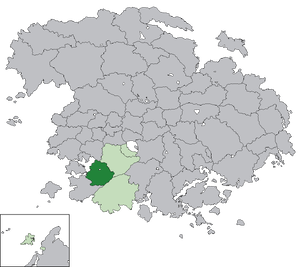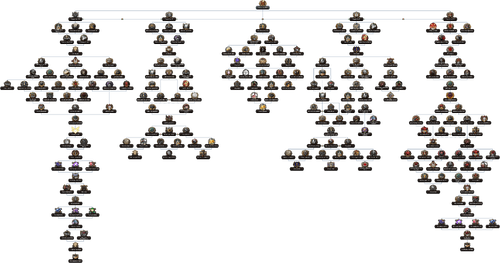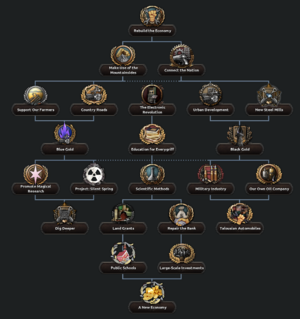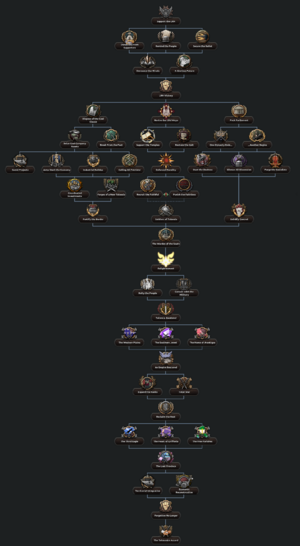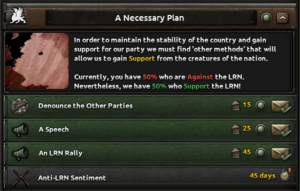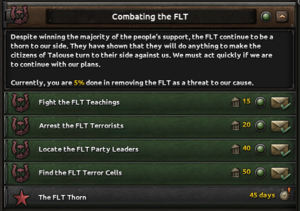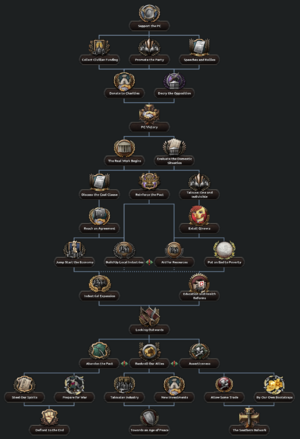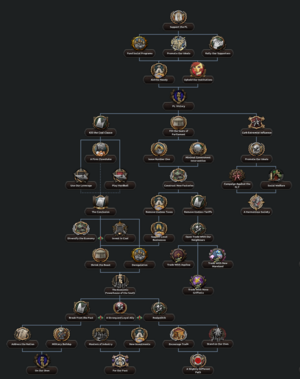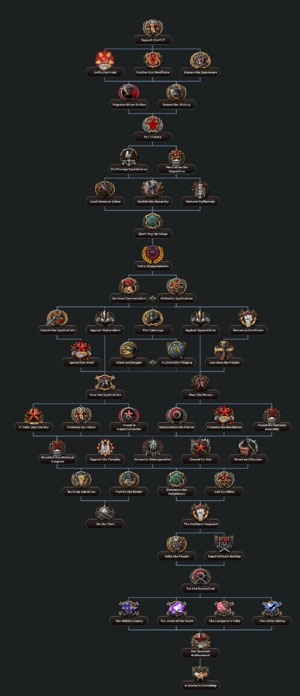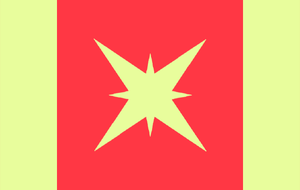Duchy of Talouse
| Attention: This page is out of date!
This article is for an earlier version of this nation. Our Wizards are at work updating it, but some information is incomplete or outdated. Want to speed things up? Visit us on Discord and volunteer to help out! |
| Duchy of Talouse | |
|---|---|
| Land of Peaks and Pastures | |
| Ideology | |
| Leader | |
| Ruling party | Partito Liberale (41%) |
| Population | |
| Ponypower | |
| Race | |
| Stability | |
| War support | |
| Factories | |
| Capital | Talononte |
| Continent | Southern Griffonia |
| Diplomacy | Member of the Karthinian Pact |
| Demonym | Talousian |
| Tag | TAL |
| Color | #ED739E |
The Duchy of Talouse is one of the 4 states of Southern Griffonia that have banded together under the Karthinian Pact. With ![]() Kingdom of Wingbardy the strongest country of the alliance, Talouse will have to balance protection from without and within.
Kingdom of Wingbardy the strongest country of the alliance, Talouse will have to balance protection from without and within.
Talouse's Duchess is Ginevra
![]() Kingdom of Wingbardy - Wingbardy's actions can be dangerous, especially if Talouse remains in a faction - leaving the faction may be the best option depending on Talouse's choices, outlined below.
Kingdom of Wingbardy - Wingbardy's actions can be dangerous, especially if Talouse remains in a faction - leaving the faction may be the best option depending on Talouse's choices, outlined below.
- A Harmonic Wingbardy will not harm Talouse, and will be a strong defensive alliance. However, this can severely limit the opportunity for expansion as Talouse will have to follow the justifying rules of a democratic nation. It will take the Keep our Friends Close focus which will influence Talouse towards Harmony.
- A Non-Aligned Wingbardy may play more aggressively and will demand Talouse's integration or gain a war goal via a decision after doing the Wingbardian Empire focus if Talouse is still in the same faction.
- A Fascist Wingbardy plays similarly to a Non-Aligned Wingbardy and will also demand Talouse's integration or gain a war goal via a decision after doing the Wingbardian Empire focus if Talouse is still in the same faction. It may take the Pressure Allies focus, which will push Talouse fascist.
- A Communist Wingbardy will go into a civil war and will disband the Karthinian Pact. A victorious Communist Wingbardy then may either attempt to annex its neighbours via war, including Talouse, or influence and integrate them.
Communist and Fascist Wingbardy, upon converting the country successfully to their ideology, can begin to integrate Talouse, reducing its autonomy at 1/day. It is best to leave the faction before this happens.
Lore
Archeological evidence dates griffon settlement in what is now Talouse to before 1000 BLB. These first inhabitants belonged to one of several dozen tribes whose names are now forgotten. The recorded history of Talouse begins with Arantigos’ conquest of the region in 620 BLB as part of his southern campaigns. Arantigos awarded the land to his nephew, Marco Talonostra, and tasked him with maintaining order and ruling in his stead. The conquest heralded a wave of migration and many Sparletans moved into the region, displacing the native population. Talonostra constructed the city of Talononte to serve as his administrative capital, and eventually the territory gained the name Talonsia, after its ward.
After Arantigos’ death, Talonostra consolidated power and declared himself King of Talonsia. With limited resources and griffonpower, Talonostra was thrown on the defensive and was forced to construct a string of mountain keeps to defend his small realm against the other post-Arantigan kingdoms. The most formidable of the rogue kingdoms proved to be Karthin, which began a series of conquests across the former empire’s southern territories in 566 BLB. The newly-born Karthinian Empire attempted three failed invasions of Talonsia, each time being repelled by the Talonostra’s defensive mountain.
Although victorious in battle, the conflicts drained enormous wealth from Talonsia. So, in 535 BLB, Talonsia agreed to become a march of Karthin. The period of peace that followed was one of prosperity for Talonsia, even as their imperial masters stagnated and declined, ultimately falling to the Wingbardians in 453 BLB. Talonsia quickly declared independence and was beset by barbarian invaders, but once again its fortifications proved impregnable. As the Wingbardian territories congealed into a patchwork of feudal states, Talonsia continued to maintain its defensive line of forts, proudly bearing the title of “Warden of the South”, a title once granted to the Talonostras by Arantigos himself.
Throughout the 2nd century BLB, Talonsia began to decentralize as local lords consolidated power around their keeps. Although the army remained loyal to the Talonostras, Talononte’s grip was loosening. The death knell came after the assassination of King Marus of Talonsia in 34 BLB. The kingdom, which by that point only nominally governed the lords, finally ceased to exist. A brutal succession war ensued, with a minor lord securing the capital and declaring himself Duke of Talononte. The birth of the ![]() Kingdom of Aquileia during the 2nd century ALB sparked a dramatic increase in trade in the western bay, greatly benefitting the region. Trade also accelerated the mixing of Talonsians and Wingbardians, and as time passed the land became more and more often referred to by its Wingbardian name, Talouse, instead of Talonsia. By the end of the 3rd century ALB, a strong Talousian culture had formed, marked by their veneration of Arantigos alongside typical Wingbardian traditions. The land remained politically disunited until 602, when Giovanni I, Duke of Talonsia was willed the Duchy of Navarro after the death of its last duke, Emmanuel IV. Giovanni accepted and combined the 2 crowns in a new state: the Duchy of Talouse.
Kingdom of Aquileia during the 2nd century ALB sparked a dramatic increase in trade in the western bay, greatly benefitting the region. Trade also accelerated the mixing of Talonsians and Wingbardians, and as time passed the land became more and more often referred to by its Wingbardian name, Talouse, instead of Talonsia. By the end of the 3rd century ALB, a strong Talousian culture had formed, marked by their veneration of Arantigos alongside typical Wingbardian traditions. The land remained politically disunited until 602, when Giovanni I, Duke of Talonsia was willed the Duchy of Navarro after the death of its last duke, Emmanuel IV. Giovanni accepted and combined the 2 crowns in a new state: the Duchy of Talouse.
When Grover I, King of Griffonstone, blessed by the Idol of Boreas, conquered ![]() Kingdom of Wingbardy in 706, Talousian forces fighting alongside the Wingbardians witnessed his army’s incredible might. As the mighty conquerer approached Folino, the last sovereign Duke, Francesco VI, bent the knee, making Talouse a vassal realm of the ascendant
Kingdom of Wingbardy in 706, Talousian forces fighting alongside the Wingbardians witnessed his army’s incredible might. As the mighty conquerer approached Folino, the last sovereign Duke, Francesco VI, bent the knee, making Talouse a vassal realm of the ascendant ![]() Griffonian Empire. Peace reigned for the next few centuries, and when massive coal deposits were discovered under the Talousian Highlands, several Wingbardian mining companies moved into the area to provide their homeland with a cheap and plentiful supply of coal.
Griffonian Empire. Peace reigned for the next few centuries, and when massive coal deposits were discovered under the Talousian Highlands, several Wingbardian mining companies moved into the area to provide their homeland with a cheap and plentiful supply of coal.
In 972, ![]() Kingdom of Wingbardy seceded from the Empire. Giovanni III, then Duke, honoured the old alliance and seceded as well. Talouse joined the new Karthinian Pact, which became the major power bloc in Southern Griffonia. One key provision of the Pact was the right for Wingbardian mining companies to continue their operations in Talouse: the infamous Coal Clause derided by nearly all Talousians. Following Wingbardy’s example, Talouse established a national Parliament in order to embrace modernity. Unfortunately, just like in Wingbardy, the Parliament proved ineffective and several governments fell in succession.
Kingdom of Wingbardy seceded from the Empire. Giovanni III, then Duke, honoured the old alliance and seceded as well. Talouse joined the new Karthinian Pact, which became the major power bloc in Southern Griffonia. One key provision of the Pact was the right for Wingbardian mining companies to continue their operations in Talouse: the infamous Coal Clause derided by nearly all Talousians. Following Wingbardy’s example, Talouse established a national Parliament in order to embrace modernity. Unfortunately, just like in Wingbardy, the Parliament proved ineffective and several governments fell in succession.
Giovanni III died in sleep in 992 and was succeeded by his hot-headed daughter, Ginevra. The most well-known moment of her reign came during the General Strike of 1003. Thousands of workers marched down the streets of Talononte, calling for less hours, more pay, and the fair treatment of workers. The city ground to a halt while Parliament scrambled to think of a solution to quiet the rabble, yet at the same time wished to stay on the good side of the industrialists. The Duchess stormed into Parliament building, shouting “Lo giuro su Boreas, se voi bastardi non fate qualcosa, appenderò ognuno di voi in piazza!” (“I swear to Boreas, if you bastards don't do something, I'll hang each of you in the square!”). The very next day, Parliament passed a resolution granting workers slightly higher wages, a slightly reduced work day and some protections.
With the election of 1007 fast approaching, incumbent Prime Minister Marco Paltiori and his liberal government will have to fight hard to keep their position. It will be a tough fight, but securing Talouse’s place in the world will be an even tougher fight, no matter which party emerges victorious…
National Focus
Economy Tree
All paths share this tree and it can be started as soon as the Elections of 1007 is completed.
The central branch is the most important, it'll give you several research bonuses and will quickly allow you to remove all development debuffs (science base, industrial base, illiteracy and poverty). You will also receive a small reduction of consumer goods and a couple of factories, the focus Public Schools will grant you 1 Research Slot.
The left branch notoriously will give you 24 crystals and bonuses to magical and nuclear research, whereas the right branch will grant you a total of 5 factories, 16 steel and a synthetic factory as well as research bonuses to synthetic resources.
The Rebirth of Talonsia
Getting the LRN in Power
The League for National Restoration is a small movement that seeks to restore Talouse to it's ancient glory, rejecting the modern movements that corrupted their once great country. The first few focuses will grant you some political power and help you gain some Supremacy poularity, however the LRN is still a fringe movement for the most part, this is where Secure the Ballot comes in.
Completing that focus will unlock a series of repeatable decisions which will slowly raise supremacy support, however it'll also have pushback from the rest of society and every 45 days you will lose some supremacy support while the percentage of those who are Against the LRN will grow. It is easily avoidable but, if when the timer runs out that percentage is 95 or greater, a civil war against the communists will start.
Once you have more than 60% support the focus LRN Victory can be taken, finishing it will disactivate these decisions, rename your country to Nova Talonsia and allow you to progress down the rest of your tree.
Solidify Control
The next section of the tree is split among three branches.
The left one is largely focused on the economy, letting you remove the Coal Clause, Sluggish Economy and leave the Karthinian Pact. It'll further give you some factories and unlock one-time decisions for Social Projects that will give you 1 civilian factory, infrastructure and some stability. Finally you will gain two 18 width infantry units and forts will be built along the mountain line to protect inner Talouse.
The central branch will seek to bring a cultural and religious revival, granting you bonuses to war support, stability and giving you ponypower and Division Recovery Rate.
The right branch will focus on ending political opposition to the LRN's rule once and for all. The monarchy will be abolished and Duchess Ginevra will be ousted, in her place Fetivola will announce the start of a regency to a promised 'Chosen One' which one day will come to lead the nation in the future. Regency for the Chosen One will give +1% Recruitable Population. Purge the Socialists will unlock a series of decisions to remove the FLT's influence, with your efforts being hampered by 5% every 45 days, if you do fall under 0%, a civil war against the communists will happen.
Once all three branches are complete you may take The Warden of the South and continue with your tree.
Nova Talonsia Awakens
Having completed his reforms, Fetivola will start looking outwards in an effort to bring Talonsia back to glory. Enlightenment will have Fetivola come to to the conclusion that he was the one chosen by Arantigos-Borea to lead the nation, this will grant him two traits, the first gives, amongst other bonuses, a powerful 5% Recruitable Population, the second will massively reduce your stability and make you lose 0.20% every week. Talonsia Awakens will grant 1 Research Slot.
His first targets will be your former companions of the Karthinian Pact. You will send ultimatums to the ![]() County of Francistria, the
County of Francistria, the ![]() Kingdom of Wingbardy and the
Kingdom of Wingbardy and the ![]() Barony of Arantiga. If they accept you will annex them and inherit their troops and generals, if they refuse you will gain an annexation war goal against them. Once you have annexed them all, the Talonsian Empire will be founded and you will be able to core their land.
Barony of Arantiga. If they accept you will annex them and inherit their troops and generals, if they refuse you will gain an annexation war goal against them. Once you have annexed them all, the Talonsian Empire will be founded and you will be able to core their land.
After the empire is proclaimed, his next set of targets will be the ![]() Falcorian Queendom, the
Falcorian Queendom, the ![]() Kingdom of Griffonstone, the
Kingdom of Griffonstone, the ![]() Federated Parishes of Sicameon and finally
Federated Parishes of Sicameon and finally ![]() New Mareland, all of which will receive an ultimatum like the previous.
New Mareland, all of which will receive an ultimatum like the previous.
Once he has finished his conquests, Fetivola will be able to core all the conquered nations, several cities and states will be renamed, you will be able to offset you stability loss and, should the ![]() Kingdom of Aquileia be ruled either by the monarchy or by supremacists, you may seek a defensive alliance with them.
Kingdom of Aquileia be ruled either by the monarchy or by supremacists, you may seek a defensive alliance with them.
Tradition Triumphs
The Conservative Party led by Antonia di Colliverde seeks to bring an end to radicalism and bring the country back to the golden age that happened after it's seccession from the ![]() Griffonian Empire. For you to start on this path, the
Griffonian Empire. For you to start on this path, the ![]() Kingdom of Wingbardy must not have done the focus Rally the Anti-Fascists. The following focuses will greatly boost your non-aligned popularity and, once PC Victory is completed, Antonia will be elected.
Kingdom of Wingbardy must not have done the focus Rally the Anti-Fascists. The following focuses will greatly boost your non-aligned popularity and, once PC Victory is completed, Antonia will be elected.
She will rekindle the economy by collaborating with fellow members of the Karthinian Pact, the Coal Clause will be reformed so that you can access your resources in Talononte and gain a boost to Resource Gain Effieciency. Evaluate the Domestic Situation will unlock a set of decisions which will grant you 1 dockyard, 1 civilian and 1 military factories as well as some infrastructure. Further focuses will give you some factories and remove the Declining Economy national spirit. Finally she will reform the education and healthcare systems and pass a Vote of Confidence on Duchess Ginevra.
Looking Outwards will give 1 Research Slot and the tree will divide into three small branches. If ![]() Wingbardy has gone communist or fascist, Talouse can leave the Karthinian Pact (in the proccess losing national spirits related to it) and gain some military bonuses. If Wingbardy has gone monarchist, Talouse can further obtain some economic bonuses and 1 civilian factory. If Wingbardy is anything other than monarchist, Talouse will be able to obtain both military and economic bonuses, in particular -2% Consumer Goods Factories.
Wingbardy has gone communist or fascist, Talouse can leave the Karthinian Pact (in the proccess losing national spirits related to it) and gain some military bonuses. If Wingbardy has gone monarchist, Talouse can further obtain some economic bonuses and 1 civilian factory. If Wingbardy is anything other than monarchist, Talouse will be able to obtain both military and economic bonuses, in particular -2% Consumer Goods Factories.
Keep the Course
The Liberal Party and its leader, Marco Paltori, is the one currently leading the nation and while their popularity has somewhat fallen in recent times, they still intend to continue their process of reformation and liberalisation of society. The first section of the tree will boost the popularity of harmony with Aid the Needy changing Marco Paltori's trait to a positive one, PL Victory can be taken as soon as harmony has 65% popularity and will open up the rest of the tree while also greatly increasing the daily gain of communism popularity.
While from there you will see three branches, only the right one can be taken for now. This short branch will seek to undermine the FLT, with Campaign Against the FLT unlocking a series of decisions to combat their influence and eventually remove the Increased FLT Activity national spirit. Doing that will allow you to take the final focus and unlock the left and central branches of the tree.
The central branch will work towards improving and opening up the economy (removing the Declining Economy spirit), you will also gain 3 civilian factories and an economic advisor which can grant you -5% Consumer Goods Factories. The left branch focuses on ammending Paltori's greatest failure: the failure to renegotiate the Coal Clause with ![]() Wingbardy, specifics are detailed in gameplay mechanics, further focuses will vary depending on the result of the renegotiations.
Wingbardy, specifics are detailed in gameplay mechanics, further focuses will vary depending on the result of the renegotiations.
Once you have finished these two branches you will be able to take The Economic Powerhouse of the South which will grant you 1 Research Slot, some bonuses and open up three minor branches dependent on external factors. The left one can be taken if ![]() Wingbardy has gone communist or fascist, you will leave the pact and receive some ponypower and generals. If Wingbardy has gone harmonist the central branch can be taken, it'll give you 1 factory, -4% consumer goods and some misc bonuses. The right path can be taken if Wingbardy is not harmonist, it'll grant you 2 factories, -2% consumer goods, some troops a few construction bonuses.
Wingbardy has gone communist or fascist, you will leave the pact and receive some ponypower and generals. If Wingbardy has gone harmonist the central branch can be taken, it'll give you 1 factory, -4% consumer goods and some misc bonuses. The right path can be taken if Wingbardy is not harmonist, it'll grant you 2 factories, -2% consumer goods, some troops a few construction bonuses.
The Hammer and the Pick
Technology
| Army | Naval | Air | Tech / Industry |
|---|---|---|---|
|
|
|
|
| Doctrine | Racial | ||
|
|
|
|
Politics
National spirits
Biography: Ginevra di Chiazbini was born the eldest child of Duke Giovanni III of Talouse. She grew up in the comfort of the Ducal Palace, and was mostly carefree, consuming the knowledge given to her by her mentors. At an early age, she demonstrated a level of unmatched decisiveness, as well as her infamous temper, which greatly contrasted her patient and naive father. Her pleasant life was turned upside down by the Falcor War, which raged from 985-989 ALB. As the war progressed, she saw her father's health rapidly deteriorate, alongside the nation's economy. After the war's end, there was a glimmer of hope for Ginevra when she married her lifelong sweetheart, the handsome Victor di Altomondi. This time of good feelings was short-lived however, as in 992, her father died of a heart attack, and the young griffoness was crowned Duchess. Ever since then, she has been a staunch pacifist, denouncing war and its horrors. Even though she was a pacifist, her belligerent constitution remained, being further incensed by the post-war economic issues. During the strike of 1003, she famously stormed into Parliament, demanding that a resolution be passed, and quickly. While this garnered the support of the common folk, she alienated parts of the upper echelons of Talousian society, who viewed it as barbaric and improper for a lady of such high standing. Today, the Duchess is mostly well-liked, and many workers herald her as a people's monarch. However, trouble is brewing in Talouse, and it remains to be seen whether Ginevra will lead her family's ancient legacy to greatness, or be its downfall.
Portrait By: Scroup
The Transnational Mining Clause in Article II of the Charter of the Karthinian Pact allows for Pact members to have resource extraction operations in each other's territories, as well as the ability to openly transport it without strict border regulation and trade agreements. A section of this Clause refers to the ability of Wingbardian mining corporations to continue their pre-secession operations in other Pact countries. Colloquially referred to as the "Coal Clause" in Talouse, it has allowed for the Wingbardian corporations to operate without restraint in the Talousian Highlands. These companies often engage in unethical practices in the pursuit of profit and efficiency. The lack of benefits to both the workers and the nation, combined with the awful conditions, has led to the Clause being, near universally, viewed with disdain, and most of Talouse's parties agree that it must be abolished.

- Daily Political Power Gain: -0.10%
- Consumer Goods Factories: 10.0%
- Research Speed: -5.00%
- Factory Output: -2.50%
- Daily Supremacy Support: +0.02
Leaders
|
|
This is a community maintained wiki. If you spot a mistake then you are welcome to fix it. |
| Starting leaders | |||||||
|---|---|---|---|---|---|---|---|
| Leader | Leader | Ideology and party | Traits | Description | Comes to power by | ||
Indecisive
|
Born: 15 March, 972 in Talononte
Biography: Marco Paltori was born in a suburb of Talononte just days after Talouse's fateful secession from the Griffonian Empire. The establishment of a national Parliament and the Duchy's first industrialisation programmes came shortly after, coinciding with the rise of the Karthinian Pact as the premier power bloc in Southern Griffonia. All throughout his childhood, Paltori saw a world that was changing rapidly, and his imagination became captivated by new possibilities for himself and his country. His time spent studying political philosophy in university caused him to become sympathetic towards the Partito Liberale, and shortly after graduating he made his debut onto the political scene as a PL candidate for Parliament. Paltori emerged victorious, and before long gained a reputation as a passionate reformist determined to bring Talouse into the modern age. His rhetoric coupled individual freedom with national pride, and his unequivocal opposition to the Coal Clause made him stand out from the older generation of PL figures. In light of this, it did not take long for him to surpass them all in popularity. Paltori's high standing with the people propelled the PL to new heights of electoral success, and he completed his meteoric rise to the position of Prime Minister just a few years after first entering Parliament. However, Paltori's tenure as Prime Minister proved to be a rocky one. Despite his youthful energy, he was still a novice in the political sphere, and this inexperience greatly hindered his agenda. He struggled with Parliament to put his economic reforms into practice and, most embarrassingly, he was unable to secure Wingbardian cooperation for his first attempt to end the Coal Clause. Despite these setbacks, Paltori remains undaunted and committed to transforming Talousian society. His public statements strike an optimistic tone towards the project of liberalisation, and he frequently claims that he will not rest until Talouse stands free and proud: out from the shackles of the past and ready to seize its own future. Portrait By: MonAx |
| |||||
Ambitious Union Boss
|
Born: 7 August, 964 in Talononte
Biography: For nearly two decades, one griffon has stood alone at the forefront of Talouse's labour movement: Emmanuel Talnara. Born to a working-class family in a poor neighborhood in Talononte, Talnara received a mediocre education, going straight to work in a factory after graduating from secondary school in 981. He toiled there for six long years before becoming a journalist for an underground newspaper promoting Marksist ideas, an influential period of his life which saw his interest in revolutionary activity fully blossom. The end of the Falcor War in 989 left the Wingbardian economy in tatters, and the domino effect proved devastating for the Talousian economy as well. Sensing an opening, Talnara used his platform to unite the many discontented workers into the Fronte Laburista Talusiano (FLT), attracting legions of urban labourers and coal miners. He organised the failed strike of 998, which resulted in his brief incarceration, as well as the Great Strike of 1003, the largest in Talousian history. Although he has achieved astonishing victories over the years and already cemented his status as a titan of the socialist movement, simply keeping the FLT together may prove to be his toughest task yet. He is quite moderate compared to the newer generation of leftists, having dedicated himself to forging a lasting compromise between the urban syndicalist and the miner communalist factions of his party. Despite these efforts, many suspect that he is past his prime, and that the beast he created will inevitably break free from his control. Portrait By: MonAx |
| |||||
Traditionalist Academic
|
Born: 2 May, 961 in Navarro
Biography: Undoubtedly the most controversial voice in Talousian politics, Amilcare Fetivola began his pursuit of truth at a young age. By the time he reached university, he believed firmly in the value of traditional wisdom, and eventually developed his ideas into a fully-realised ideology, seeing a return to tradition as a remedy to the ills of modernity. Fetivola's brief stint as a history professor was cut short by his own restlessness—not content to live the life of an academic, he decided to enter into politics, joining the FLT in 991 and becoming active in the socialist movement. His membership in the party lasted only four years before he was expelled for espousing ideas incompatible with the FLT's core platform. Shortly after this, Fetivola published his manifesto: "Revolt Against The Modern World," in which he described his beliefs about renewing faith in Arantigos, restoring the customs and language of ancient Talonsia, and resurrecting the glorious "Warden of the South." His manifesto attracted a small but devout following drawn from the middle class, poor farmers, anti-communists, and youths disillusioned by the economic depression. Leading these "Fetivolists," he went on to form the Lega per il Restauro Nazionale (LRN), which became the major far-right group in Talouse, supplanting the pro-Wingbardian Succursale Talousiano delle Ali Nere (STAN). Now that the LRN has completed its meteoric rise, Fetivola finally has the power to take control of the nation, and work towards the destiny he knows awaits him. Portrait By: MonAx |
| |||||
Socialite Connections
|
Born: 24 June, 953 in Luchihoot
Biography: The favourite daughter of Luchihoot and member of a minor noble family hailing from northern Talouse, Antonia di Colliverde is a throwback to a simpler era of Talousian politics. She came of age during the South's secession from the Griffonian Empire, and witnessed first-claw the economic boom that followed. Seeing the hope and prosperity which was gained through cooperation greatly influenced her worldview, and to this day she remains one of the most unabashedly pro-Wingbardian figures in Talouse. She joined the Partito Conservatore shortly after its creation, and eventually won a seat in parliament during the PC's landslide victory in the snap elections of 983. However, the start of the Falcor War just two years later would mark a turning point for the party's fortunes. Over the four year course of the war, around 20,000 Talousian soldiers were sent to the Falcorian front, with thousands dying before it ended. Those that returned were scarred by the horrors of war, and many began to voice discontent with the nation's diplomatic policy. In addition, the conflict had left the Wingbardian economy in tatters, leaving them unable to pay back their debts to Talouse. The ensuing economic devastation shattered a generation of young griffons' trust in the status quo, signalling the start of a long and slow decline in PC popularity, paving the way for the Partito Liberale to rise and become the dominant force in parliament. Throughout all her years in public life, di Colliverde has been a staunch supporter of conservative economic and social policies. These are mainly geared toward recreating the conditions of 970s Talouse, which she believes to have been its golden age. While realising the necessity of limited reform, she does not favour completely eliminating the Coal Clause, a position not favoured by the general populace. Despite these headwinds, she has presided over a genuine resurgence for her party, at last gaining a chance to repair the nation's rifts and forge an even stronger alliance with Wingbardy. Portrait By: MonAx |
| |||||
| Post-1007 leaders [may contain spoilers] | |||||||
| Leader | Leader | Ideology and party | Traits | Description | Comes to power by | ||
Decentralized Council
|
| ||||||
Permanent Revolutionary
|
Born: 18 December, 981 in Talononte
Biography: Much like her predecessor, Emmanuel Talnara, Giulia Rosbeccini was born in a poor working neighborhood in Talononte to a left-leaning family. As such, she was exposed to the FLT at a young age and quickly became enamored with both syndicalism and the theory of worker's liberation. This affinity carried over into adulthood, and she joined the FLT only a few months after beginning work in a factory in 1001. Thanks to her natural intellect and ability to rile up crowds with passionate speeches, she rapidly rose through the ranks of the party. Her claim to fame came when she was tasked with organising nearly half of Talononte's industrial workers to strike in the infamous Strike of 1003, which she did impeccably. By 1007, she was second only to Talnara in terms of authority and popularity within the FLT, having gained a reputation as an uncompromising radical and figurehead of the hard-line syndicalist faction. After the party's acrimonious schism, circumstances called for a fresh face to take the reins of the party's leadership, and Rosbeccini was eager to step up. Although she still respects the old griffon Talnara, she always saw him as too weak and idealistic. Events have proved her right, having demonstrated that for all Talnara's attempts at compromise, in the end there was no common ground on which to stand. Believing that a worker's Talouse will never survive if it stands alone against the rest of the world, she is dedicated to the prospect of spreading the Revolution to the rest of Southern Griffonia and establishing a grand, region-wide union. Portrait By: MonAx |
| |||||
Traditionalist Academic
Chosen of Arantigos-Boreas
Rambling Lunatic
|
Born: 2 May, 961 in Navarro
Biography: Undoubtedly the most controversial voice in Talousian politics, Amilcare Fetivola began his pursuit of truth at a young age. By the time he reached university, he believed firmly in the value of traditional wisdom, and eventually developed his ideas into a fully-realised ideology, seeing a return to tradition as a remedy to the ills of modernity. Fetivola's brief stint as a history professor was cut short by his own restlessness—not content to live the life of an academic, he decided to enter into politics, joining the FLT in 991 and becoming active in the socialist movement. His membership in the party lasted only four years before he was expelled for espousing ideas incompatible with the FLT's core platform. Shortly after this, Fetivola published his manifesto: "Revolt Against The Modern World," in which he described his beliefs about renewing faith in Arantigos, restoring the customs and language of ancient Talonsia, and resurrecting the glorious "Warden of the South." His manifesto attracted a small but devout following drawn from the middle class, poor farmers, anti-communists, and youths disillusioned by the economic depression. Leading these "Fetivolists," he went on to form the Lega per il Restauro Nazionale (LRN), which became the major far-right group in Talouse, supplanting the pro-Wingbardian Succursale Talousiano delle Ali Nere (STAN). Now that the LRN has completed its meteoric rise, Fetivola finally has the power to take control of the nation, and work towards the destiny he knows awaits him. Portrait By: MonAx |
| |||||
Parties
| Political parties | |||||
|---|---|---|---|---|---|
| Name | Ideology | Leader | Popularity | ||
| PL Partito Liberale |
Democratic Monarchism Harmony |
Marco Paltori | 42% | ||
| FLT Fronte Laburista Talusiano |
Syndicalism Communism |
Emmanuel Talnara | 13% | ||
| LRN Lega per il Restauro Nazionale |
Authoritarian Theocracy Supremacy |
Amilcare Fetivola | 7% | ||
| PC Partito Conservatore |
Conservative Liberalism Non-Aligned |
Antonia di Colliverde | 38% | ||
Staff and Designers
|
|
This is a community maintained wiki. If you spot a mistake then you are welcome to fix it. |
| Name | Trait | Requirement | Effect | Cost |
|---|---|---|---|---|
| Captain of Industry |
|
|||
| Rearmer |
|
|||
| Master Maneuverer |
|
|||
| Education Reformer |
|
|||
| Illusive Gentlebeing |
|
|
||
Military Leaders
|
|
This is a community maintained wiki. If you spot a mistake then you are welcome to fix it. |
| Field Marshal | ||||
|---|---|---|---|---|
| Field Marshal | Traits | Description | Skills | Race |
Fabrizio Dellucci |
||||
| Generals | ||||
|---|---|---|---|---|
| General | Traits | Description | Skills | Race |
Dona Castiglione |
||||
Ermete Costa |
||||
| Admiral | ||||
|---|---|---|---|---|
| Admiral | Traits | Description | Skills | Race |
Iacopo Boni |
||||
Flags
| Flags | |
|---|---|
| Flag | Information |
   | |
 | |
 | |
 | |
 | |
 | |
 | |
Economy
Laws and Development
Industry
Military Factories |
Naval Dockyards |
Civilian Factories |
Fuel Silos |
Synthetic Refineries |
|---|---|---|---|---|
| 3 | 1 | 4 (-2) | 0 | 0 |
Numbers in red indicate the number of civilian factories required to produce consumer goods, based on economy laws and the total number of military and civilian factories, rounded up.
Oil |
Aluminum |
Rubber |
Tungsten |
Steel |
Chromium |
Crystal |
|---|---|---|---|---|---|---|
| 0 | 0 | 0 | 0 | 6 (-3) | 18 (-9) | 0 |
Numbers in red indicate how many resources are reserved for export due to trade laws.
![]() Kingdom of Wingbardy has rights to extract Talouse's significant deposits of aluminum and almost half of its steel.
Kingdom of Wingbardy has rights to extract Talouse's significant deposits of aluminum and almost half of its steel.
Strategies and guides
Starting situation
Threats and opportunities
Guides
+ Add it to this article and help other players!
Please note the style guidelines.


